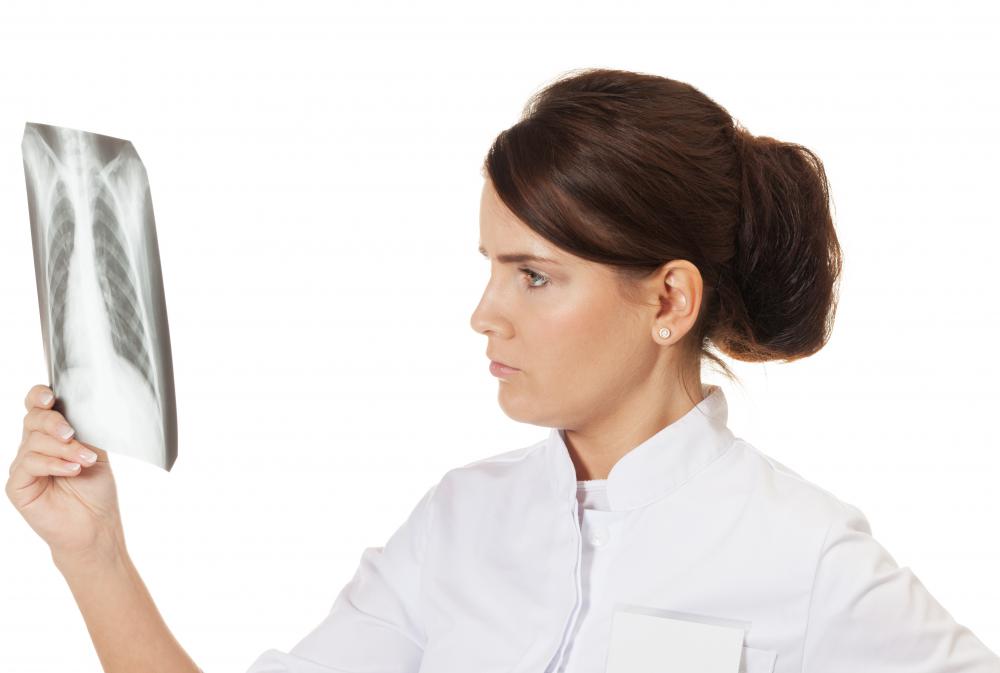At WiseGEEK, we're committed to delivering accurate, trustworthy information. Our expert-authored content is rigorously fact-checked and sourced from credible authorities. Discover how we uphold the highest standards in providing you with reliable knowledge.
What are the Most Common Causes of Chest Phlegm?
Though chest phlegm is usually not itself identified as a dangerous symptom, it often is indicative of serious illness or infection. The most common cause of chest phlegm is the common cold, though those younger than the age of thirteen who experience chest phlegm are more likely to be diagnosed with croup. Other common causes of chest phlegm include sinusitis, bronchitis, and different types of pneumonia. Often, these conditions are treated quite aggressively, especially for the elderly, the very young, or others who may be suffering from a weakened immune system as they can develop into quite serious conditions.
One of the most common causes of chest phlegm is the common cold. Unlike colds that predominantly target the upper respiratory system, those that cause chest phlegm tend to last for several weeks. In some cases, prescription medications may be required to completely eradicate symptoms.

Another common cause of chest phlegm is croup. Typically, croup occurs almost entirely in children below the age of thirteen. Other common symptoms associated with croup include extreme breathing difficulty, a hacking cough, and other similar conditions. Croup can be difficult to treat, as it is often mistaken for other conditions that affect the very young.

Sinusitis has also been commonly linked to the development of chest phlegm. As the name suggests, sinusitis typically starts with sinus inflammation. While most cases of sinusitis are relatively acute, chronic sinusitis is more often to blame for the development of chest and nasal phlegm. As with colds that refuse to go away, patients whose sinusitis does not respond to normal treatment may require prescription medications.

One of the more serious causes of chest phlegm is pneumonia. Pneumonia is most often caused by a viral or bacterial infection, and typically leaves those affected with high amounts of chest congestion, breathing difficulty, fatigue, and a high fever. Pneumocystis carnii pheumonia is a specific type of pneumonia that is caused by a fungal infection, and occurs most commonly in those who have previously been diagnosed with AIDS. In some cases, pneumocystis carnii pheumonia can lead to heart failure and death.

Bronchitis is another of the more serious causes of chest phlegm. Bronchitis typically occurs when the bronchial tubes in the lungs become inflamed. This results in the development of high amounts of chest mucus and phlegm, and can also lead to severe shortness of breath, sinus pressure, and difficulty eating or even swallowing. Due to these symptoms, bronchitis is often treated quite aggressively, especially in the elderly or very young.
AS FEATURED ON:
AS FEATURED ON:

















Discussion Comments
I was surprised to learn that you can develop chest phlegm just by breathing in irritants. I discovered this while cleaning out a very dusty carport.
I should have worn a mask, but I didn't. As soon as I started sweeping and wiping things down, the dust began to fly around, and I inevitably inhaled it. Within minutes, I was coughing.
Later on that day, I started coughing up chest phlegm. I knew that I needed to cough it all up to get the irritants out of my lungs, so I didn't take any cough suppressant. It took a few days, but the cough finally subsided.
I suffer from allergies constantly, so I have a lot of phlegm in my throat. I notice it more at night and first thing in the morning.
When I lie down, the mucus drains into my throat. I think that it might go down into my lungs at night, because after I wake up in the morning, I have to cough up phlegm for about an hour before it's all gone.
I take a daily antihistamine that's supposed to last for 24 hours, but it doesn't eliminate all my symptoms. I know that I would be worse off without it, but I really wish it could help with the phlegm production.
@cloudel – The chest congestion and phlegm that bronchitis causes can make you feel like you are dying. I actually went to the emergency room one night when I had a severe coughing fit that just would not stop.
They told me that since it was viral, the only thing that I could take was strong prescription cough medicine and acetaminophen for the fever. The cough syrup helped me sleep at night.
They also told me to hang my head over a pot of boiling water. This would loosen the phlegm and help me cough it up more easily.
The most important piece of advice they gave me was to get lots of rest. I had been trying to run the household even while sick, and I had to stop that and stay in bed. I couldn't ever recover otherwise.
What kind of medication do doctors give you for bronchitis? I've always heard it is caused by a virus, so antibiotics won't help. Surely, there has to be something they can give people to help them recover!
I've been coughing up phlegm steadily for two weeks, and I feel like I'm about to die. I've got to do something about it, because it doesn't seem to be going away.
Post your comments